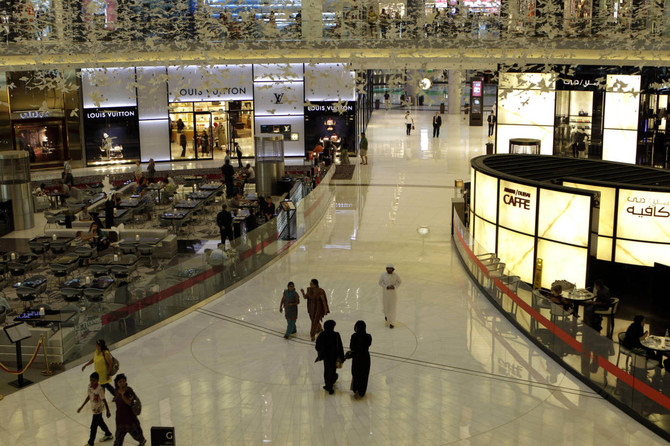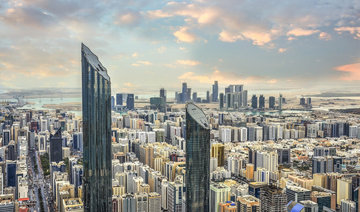LONDON: Anticipated increases in wages coupled with lower rents are expected to make the UAE’s new value-added-tax (VAT) more bearable for a population used to a mostly tax-free existence, according to recruitment agents and analysts.
From Jan. 1, the Gulf state introduced a 5 percent levy on a wide range of products and services, including food, clothes and hotel rooms in an effort to create a new source of government revenue.
It is a move backed by organizations such as the International Monetary Fund (IMF), which wants to see the Gulf region diversify away from a dependency on oil.
Saudi Arabia has also introduced VAT this year, while other neighboring countries are expected to follow suit in the coming years.
While it may take some time for residents to get used to a slightly more expensive morning coffee or cinema trip, those working in recruitment say the tax will have a limited impact on the cost of living and will not immediately deter people from wanting to apply for a job in the region.
Chris Greaves, managing director for the Gulf region at the recruitment firm Hays said had been flooded with inquiries from jobseekers.
“The number of CVs we receive vastly outnumbers the number of jobs that we register, and we hear this also from employers in the region, so on the face of it there is definitely an oversupply of candidates in general. Interest in the region is definitely growing,” he said.
Expected salary hikes this year are likely to cushion the immediate impact on residents’ wallets, said Trefor Murphy, chief executive of recruitment firm Cooper Fitch, based in Dubai.
“We are probably looking at salary increases across the UAE of about 2 percent to 2.5 percent for 2018,” Murphy said.
Consultancy firm Aon Hewitt’s annual salary survey released in September 2017 forecast even higher levels of growth, predicting UAE salaries to rise by 4.3 percent in 2018.
While wages are forecast to increase, Murphy warned against companies thinking they have to give in to pressure to improve salary packages purely to offset the cost of VAT for employees.
“I’ve had 20 calls today from our clients asking us what VAT is doing, what the cost of living is doing and what the corresponding salaries look like for the year ahead,’’ he said.
“There is no justification for increasing salaries by anything at the moment. VAT is VAT and it shouldn’t impact on the business. Businesses aren’t making 5 percent more, so they can’t pay 5 percent more,” he said.
He added that the falling cost of renting or buying in the UAE — which is usually residents’ largest outgoing — will already go some way to offset the ill-effects of the introduction of VAT.
Apartment rents in Abu Dhabi have declined by 13 percent on a year-on-year basis, while in Dubai rents fell by 6.2 percent year-on-year, according to a third-quarter real estate report from JLL.
“Actually people will have more money in their pockets this year than they would have done in 2012, 2013, 2014, 2015,” Murphy said.
Sectors likely to be ramping up hiring in the coming years include consultancies, government agencies and other companies looking for tax experts and accountants to help them with the transition to charging VAT, recruiters say.
“Accountants will be rubbing their hands in glee,” said Nigel Sillitoe, founder and CEO of Insight Discovery, in Dubai.
Murphy added that the technology sector is “booming” with plenty of employment opportunities for expats.
While UAE expats’ way of life will not change for the worse overnight, there will be those asking if the VAT charge is a sign of greater taxation to come.
“There is lot of talk of what’s next? Does the 5 percent become 20 percent? All of those things have bigger impact,” said Murphy.
While noting it was too early to judge the full impact of VAT on expat numbers, Sillitoe said, “My gut feeling is that there are more people leaving than arriving — some people blaming it on cost of living and fear that VAT is just the start of other taxes being introduced.”
Commenting specifically on British expats, he noted: “Fewer friends of mine are saying ‘XYZ is moving to Dubai, can you meet them and give them some tips?’ I used to get calls like that all the time in the past but in the last year I can’t think of one — which is a sign.”
Salary hikes, lower UAE rents to take sting out of VAT
Salary hikes, lower UAE rents to take sting out of VAT

Saudi Arabia’s cultural sector is a new economic engine between Riyadh and Paris, says ambassador

RIYADH: Culture has become a fundamental pillar in bilateral relations between France and Saudi Arabia, according to the French Ambassador to the Kingdom, Patrick Maisonnave.
Maisonnave noted its connection to the entertainment and tourism sectors, which makes it a new engine for economic cooperation between Riyadh and Paris.
He told Al-Eqtisadiah during the opening ceremony of La Fabrique in the Jax district of Diriyah that cultural cooperation with Saudi Arabia is an important element for its attractiveness in the coming decades.
La Fabrique is a space dedicated to artistic creativity and cultural exchange, launched as part of a partnership between the Riyadh Art program and the French Institute in Riyadh.
Running from Jan. 22 until Feb 14, the initiative will provide an open workspace that allows artists to develop and work on their ideas within a collaborative framework.
Launching La Fabrique as a space dedicated to artistic creativity
The ambassador highlighted that the transformation journey in the Kingdom under Vision 2030 has contributed to the emergence of a new generation of young artists and creators, alongside a growing desire in Saudi society to connect with culture and to embrace what is happening globally.
He affirmed that the relationship between the two countries is “profound, even cultural par excellence,” with interest from the Saudi side in French culture, matched by increasing interest from the French public and cultural institutions unfolding in the Kingdom.
Latest estimates indicate that the culture-based economy represents about 2.3 percent of France’s gross domestic product, equivalent to more than 90 billion euros ($106.4 billion) in annual revenues, according to government data. The sector directly employs more than 600,000 people, making it one of the largest job-creating sectors in the fields of creativity, publishing, cinema, and visual arts.
Saudi Arabia benefiting from French experience in the cultural field
Maisonnave explained that France possesses established cultural institutions, while Saudi Arabia is building a strong cultural sector, which opens the door for cooperation opportunities.
This comes as an extension of the signing of 10 major cultural agreements a year ago between French and Saudi institutions, aiming to enhance cooperation and transfer French expertise and knowledge to contribute to the development of the cultural system in the Kingdom.
He added that experiences like La Fabrique provide an opportunity to meet the new generation of Saudi creators, who have expressed interest in connecting with French institutions and artists in Paris and France.
La Fabrique encompasses a space for multiple contemporary artistic practices, including performance arts, digital and interactive arts, photography, music, and cinema, while providing the public with an opportunity to witness the stages of producing artistic works and interact with the creative process.













